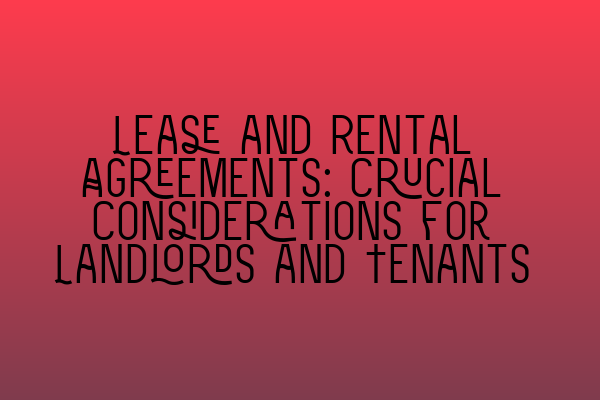Lease and Rental Agreements: Crucial Considerations for Landlords and Tenants
Are you a landlord or a tenant looking to enter into a lease or rental agreement? It’s important to be well-informed and aware of the key considerations involved in such agreements. A lease or rental agreement serves as a legally binding contract that outlines the rights and responsibilities of both parties. Whether you’re a landlord leasing out a property or a tenant searching for a place to rent, understanding the essential aspects of lease and rental agreements is crucial to avoiding future disputes and ensuring a smooth and satisfactory experience for all parties involved.
1. Clearly Defined Terms and Conditions
One of the fundamental elements of a lease or rental agreement is the inclusion of clearly defined terms and conditions. These terms should cover various aspects such as the duration of the agreement, rent payment details, security deposits, utilities, maintenance responsibilities, and any additional provisions specific to the property. It’s essential for both landlords and tenants to fully understand and agree upon these terms before signing the agreement. This helps prevent any confusion or misunderstandings down the line.
2. Rent and Security Deposits
Rent payment arrangements should be clearly mentioned in the lease or rental agreement. This includes specifying the monthly rent amount, payment due date, and accepted payment methods. In addition, the agreement should outline the protocol for rent increases, if applicable, including the notice period required. Landlords should also establish guidelines for security deposits, including the amount, acceptable use of the deposit, and the process for returning the deposit at the end of the tenancy.
3. Maintenance and Repairs
Defining the responsible party for property maintenance and repairs is a crucial consideration in lease and rental agreements. The agreement should outline the responsibilities of both landlords and tenants for routine maintenance, such as lawn care and minor repairs. Additionally, it’s essential to set out procedures for emergency repairs and the required response time for landlords to address such issues.
4. Termination and Renewal
Lease and rental agreements should clearly state the terms and conditions for termination or renewal of the lease. This includes specifying the notice period required for either party to terminate the agreement, as well as any penalties or responsibilities associated with early termination. Landlords and tenants should familiarize themselves with these provisions to avoid running into legal issues during the termination or renewal process.
5. Compliance with Local Laws and Regulations
Lease and rental agreements must comply with local laws and regulations. Landlords and tenants must ensure that their agreements adhere to the specific requirements of their respective jurisdictions. Legal experts specializing in contract law can provide guidance on how to draft agreements that are in line with relevant legislation. Seeking professional advice and staying updated with changing laws and regulations is crucial for both landlords and tenants.
Conclusion
Entering into a lease or rental agreement is a significant step for both landlords and tenants. Being well-informed about the essential aspects of these agreements is key to maintaining a healthy landlord-tenant relationship and avoiding potential disputes. Clearly defined terms and conditions, rent and security deposit arrangements, maintenance and repair responsibilities, termination and renewal provisions, and compliance with local laws are all critical considerations when creating a lease or rental agreement.
If you’re preparing for the SQE (Solicitors Qualifying Examination) or looking for additional legal resources, check out these related articles:
– SQE 1 Practice Exam Questions
– SQE 1 Practice Mocks FLK1 FLK2
– SQE 2 Preparation Courses
– SQE 1 Preparation Courses
– SRA SQE Exam Dates
These resources will provide you with valuable information and support as you navigate through the process of becoming a qualified solicitor. Good luck with your legal journey!
